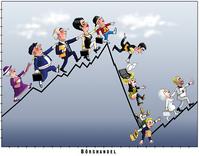As
usual, most commentators linked Kvashnin's removal to problems within
the military. There is no question that the Kremlin had become
concerned with the situation in the military -- heads would not have
rolled otherwise -- but the Kremlin was concerned with the state of the
military in a purely bureaucratic, not a professional sense.
No one was punished or promoted on the basis of his job performance.
The issue is not the course of military operations in Chechnya or the
progress of the much-ballyhooed military reform. The only real problem
that had to be solved was that, despite Kvashnin's loyalty to Defense
Minister Sergei Ivanov, President Vladimir Putin's team did not have
full control of the entire military, security and law enforcement
complex.
During the past four years, the Kremlin has made very clear to all
involved that mere loyalty is not enough. In the final analysis, the
Putin team trusts no one but their own. The "civilian" Ivanov, who like
Putin served in the foreign intelligence arm of the KGB, has also had
to contend with the solidarity of the military top brass. Kvashnin
wasn't exactly a true-blue general himself, of course, having graduated
from a nonmilitary university and "snuck into" the military though the
back door, as many regulars believed. But compared to the former
chekist Ivanov, Kvashnin looked like the genuine article.
Now command of the military has been unified. Next up -- army
intelligence, which until recently existed in a world of its own. The
mutual hostility between military and civilian intelligence is
well-known, and first emerged in the Soviet era. Now commercial
rivalries have been added to the mix. Serving ideology or the interests
of the state is a thing of the past. Only dim memories remain of
corporate ethics in the security services, which are increasingly
dominated by a free-market spirit. Agents trained in surveillance now
offer their services to private clients. Those trained in munitions
make their money blowing things up. The closed system in these agencies
makes it very easy for agents to launder money from their questionable
moonlighting work through reliable people and mysterious companies both
here and abroad.
As one military expert put it recently, army intelligence is gradually
becoming a disorganized, badly managed confederation of various gangs
and companies. The arrival of the Kremlin's team will mean a renewed
struggle for spheres of influence. We have a pretty good idea how this
sort of thing happens in the mafia, but how will it play out in the
security services and the many related organizations? We won't see
all-out battles and the use of heavy artillery, of course. And
increasingly dubious reports will be filed up the chain of command as
before. But control will be lost entirely.
In this situation it is pointless to talk about a war on terrorism. All
sorts of nasty incidents will occur with increasing frequency,
providing journalists with endless opportunities to divine when real
extremists are involved and when we are dealing with a provocation. And
barring other unexpected problems, those in power will regain control
of the situation sooner or later, deal with the troublemakers and
redirect the revenue streams. But for that time is needed, something
the friends of the Kremlin might not have.
The Putin team planned to launch a revolution in its second term, to
solve all of its problems and meet all of its obligations in one fell
swoop. They'll strip pensioners of their benefits, herd university
students into the Army and curtail free education and healthcare.
They'll try to undermine the power of the governors by redrawing
administrative boundaries and amalgamating various regions. The liberal
intelligentsia will be kept off the airwaves and the Communists will be
driven out of politics. A new and improved oligarchy will be hastily
created to replace the old disloyal one.
Revolutionary methods work well during a revolution, but you cannot
destabilize a country in which revolutionary chaos already reigns.
The current regime has no plans to unleash revolution, or even counter-revolution, but it can certainly create chaos.
*director of the Institute of Globalization Studies.
 Boris Kagarlitsky*
Boris Kagarlitsky*